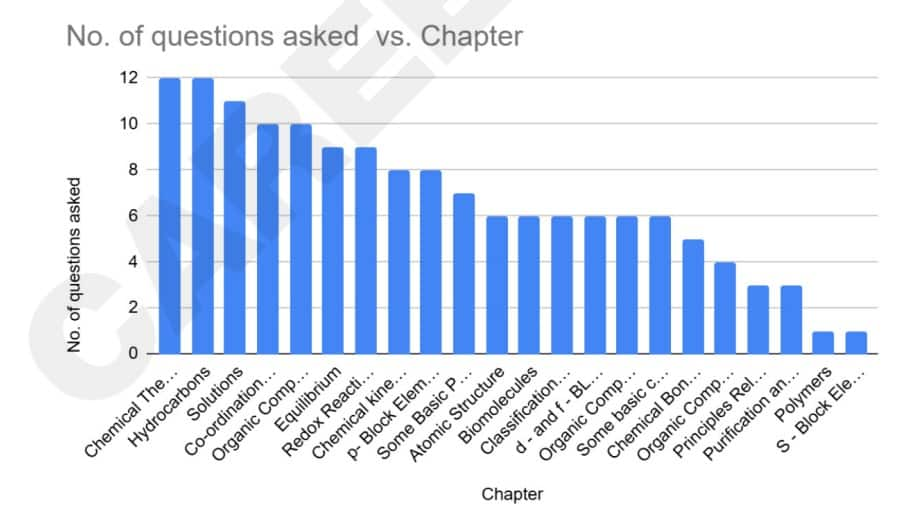Amity University-Noida B.Tech Admissions 2026
Among top 100 Universities Globally in the Times Higher Education (THE) Interdisciplinary Science Rankings 2026
How To Score High In JEE Main Chemistry Paper 2026- If you are getting ready for JEE Main 2026, you need to have a balanced plan for all three subjects: Physics, Chemistry, and Mathematics. Chemistry has been proven to be a scoring subject as it has conceptual understanding, factual knowledge, and application. In this article, we have provided the exam pattern, chemistry weightage, and Top 5 important chapter with their topics, including high-weightage topics from each section of Chemistry, along with the best books for Chemistry for JEE Main 2026. The registration process for JEE Main 2026 is now open, and students can apply from 31 October 2025 to 27 November 2025. Session 1 of the exam will be conducted from 21 to 30 January 2026.
This Story also Contains

Also read: JEE Main Chapter Wise PYQs
1. Understand the Syllabus and Topic Weightage
Before you start preparing, get a clear idea of the entire JEE Main Chemistry Syllabus. Identify which topics carry more weight and are frequently asked in previous exams. This will help you prioritize and plan your study effectively.
2. Make a Study Plan
You have to make a daily study plan that has all the subjects of JEE Main. It should have time for revision, mock tests, and also include short breaks in it to avoid exhaustion. A well-prepared plan will help you stay focused and consistent.
3. Begin your preparation with NCERT textbooks
Begin your preparation with NCERT textbooks of Chemistry for Classes 11 and 12, as they cover fundamental concepts and frequently asked questions in JEE Main. Once you’re confident, move to advanced reference books like O.P. Tandon for Physical, Organic, and Inorganic Chemistry, and Morrison & Boyd for Organic Chemistry to strengthen your understanding and problem-solving skills.
4. Practice Previous Year Papers (PYQs)
Do practice at least 10–12 years of JEE Main question papers. This is beneficial for you to understand the pattern, difficulty level, and most repeated question of JEE Main exam.
5. Take Mock Tests Under Exam Conditions
Create real exam Situations with mock tests. Check mistakes, and maintain a notebook to note down errors and then do improvements.
Also Read:
The weightage of JEE Main Chemistry is given below according to the JEE Mains 2026 syllabus. You can refer to it to know which chapters to focus on:
Chapter Name | Weightage |
Chemical Thermodynamics | 6.95% |
Some Basic Concepts in Chemistry | 7.79% |
5.26% | |
Solutions | 5.47% |
6.11% | |
Atomic Structure | 4.63% |
Equilibrium | 5.26% |
Chapter Name | Weightage |
Co-ordination Compounds | 8.21% |
p-Block Elements | 4.21% |
5.26% |
Chapter Name | Weightage |
Hydrocarbons | 5.26% |
5.26% | |
Some Basic Principles of Organic Chemistry | 6.32% |
4.42% |
Also read:
Among top 100 Universities Globally in the Times Higher Education (THE) Interdisciplinary Science Rankings 2026
Last Date to Apply: 28th Feb | Ranked #43 among Engineering colleges in India by NIRF | Highest Package 1.3 CR , 100% Placements
The Top five most scoring topics in Physical Chemistry are given below:
Chapter Name | Most Scoring Topics |
| Chemical Thermodynamics | Standard Enthalpy Of Formation, Combustion And Bond Dissociation |
| Lattice Enthalpy, Hydration Enthalpy And Enthalpy Of Solution | |
| Reversible, Irreversible, Polytropic Process | |
| First Law Of Thermodynamics | |
| Graphical Comparison Of Thermodynamic Processes | |
| Spontaneity In Thermodynamics | |
Chemical Kinetics | Effect of Temperature on Rate of Reaction: Accurate Dependency of K on T |
Equilibrium | |
Redox Reaction And Electrochemistry | |
Quantitative Aspect of Electrolytic Cell: Faraday's First Law | |
Solutions | |
Boost your JEE Main 2026 score by focusing on the most scoring chapters and topics in Organic Chemistry. This table highlights high-weightage areas, helping you prioritize your preparation, practice effectively, and maximize marks in the exam.
Chapter Name | Most Scoring Topics |
Biomolecules | Disaccharides and Polysaccharides |
Hydrocarbons | |
Organic Compounds Containing Oxygen | |
Nucleophilic Addition Reaction | |
Some Basic Principles Of Organic Chemistry | |
Focus on the high-yield chapters and topics in JEE Main 2026 Chemistry to enhance your scoring potential. Use this table to identify important areas for targeted practice and efficient revision.
Chapter Name | Most Scoring Topics |
Coordination Compounds | |
D - And F - Block Elements | |
Preparing for JEE Main 2026 Chemistry becomes much easier when you focus on chapter-wise important questions. This list highlights the most frequently asked chapters, helping you identify high-weightage areas and prioritize your preparation.
| Topic Name | Chapter | No. of questions asked in 2025 |
| MOLE CONCEPT AND MOLAR MASS | Some basic concepts in chemistry | 7 |
| Crystal Field Splitting in Octahedral Field | Co-ordination Compounds | 5 |
| Percentage Composition And Equivalent Weight | Some basic concepts in chemistry | 5 |
| First Order Reaction | Chemical kinetics | 4 |
| Magnetic Properties and Character | d - and f - BLOCK ELEMENTS | 4 |
The Following Graph gives the idea of last year's breakdown of the chemistry chapter:

To increase the chances of getting good marks, you need to refer to good books as per the JEE Mains 2026 syllabus. Here you can check the best books for chemistry:
Book Title | Author/Publisher |
NCERT Chemistry (Class 11 & 12) | NCERT |
Physical Chemistry | O. P. Tandon |
Numerical Chemistry | P. Bahadur |
Organic Chemistry | Morrison & Boyd |
Organic Chemistry | O. P. Tandon |
Concise Inorganic Chemistry | J. D. Lee |
Inorganic Chemistry | O. P. Tandon |
Practice Papers & Solved Questions | Oswaal / Arihant |
Also read: JEE Main 2026 Chemistry Important Formulas
Frequently Asked Questions (FAQs)
In JEE Mains Chemistry is divided into three subparts (Physical, inorganic and organic). In Physical Chemistry few are difficult chapters like Thermodynamics, Equilibrium and Chemical Kinetics.
There are 25 questions of Chemistry in the JEE Mains Exam.
Yes, There is negative marking in JEE Mains Exam. 4 marks for every right answer, and 1 mark will be deducted for each incorrect answer in section A (20 Multiple choice questions) but for section B (5 questions in which their answer is an integer value.) there is no negative marking.
One book is not sufficient for the JEE mains Exam. Chemistry has three subsections (Physical, organic and inorganic). The section wise best books for JEE Mains Chemistry are provided above.
Yes, especially for Inorganic and Organic Chemistry. Many questions are directly taken from NCERT. For Physical Chemistry, refer to numerical practice from books.
Use a chapter-wise flashcard for studying reactions,and formulas. Give time to high-weightage topics and refer to previous year questions.
Give time to conceptual clarity and pattern understanding. You should practice MCQs by topic, especially reaction-based and numerical problems.
On Question asked by student community
Approx 1 lakh to 3 lakhs as you are from a general category
There are many NITs that accepts JEE Main rank below 35,000 in different branches including Civil Engineering, Chemical Engineering, and many more. These NITs are -
Yes, based on previous years' trends, some of the good colleges that offer BTech admissions with JEE Main rank between 65,000–80,000 include:
Arnav Gautam & P.Mohith secured 300 out of 300 in JEE Mains session 1, as per the provisional answer key. The list of toppers to be released with JEE Main results
JEE Main 2026 session 1 result is not declared yet. JEE Main session 1 result will be declared on February 12.
Among top 100 Universities Globally in the Times Higher Education (THE) Interdisciplinary Science Rankings 2026
Recognized as Institute of Eminence by Govt. of India | NAAC ‘A++’ Grade | Upto 75% Scholarships
Highest CTC 44.14 LPA | UGC Approved | 1600+ Recruiters | 100% Placement
India's youngest NAAC A++ accredited University | NIRF rank band 151-200 | 2200 Recruiters | 45.98 Lakhs Highest Package
Last Date to Apply: 28th Feb | Ranked #43 among Engineering colleges in India by NIRF | Highest Package 1.3 CR , 100% Placements
NAAC A++ Grade | Recognized as Category-1 Deemed to be University by UGC | 41,000 + Alumni Imprints Globally